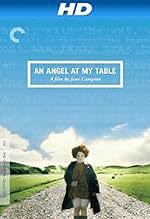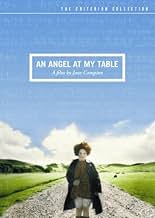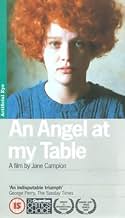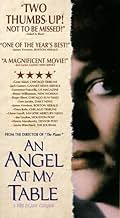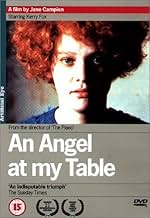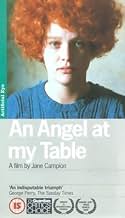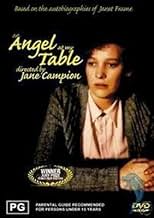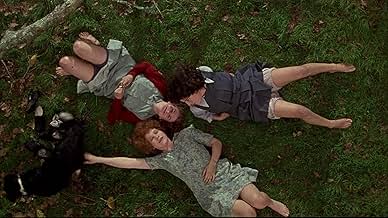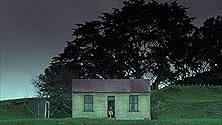IMDb रेटिंग
7.4/10
9.2 हज़ार
आपकी रेटिंग
जेनेट फ़्रेम एक होनहार बच्ची थी, जिसका किशोर अवस्था में, सिज़ोफ्रेनिया से ग्रसित होने का गलत रोगनिर्णय किया गया था. जेनेट की दुनिया की खोज और यूरोप में उसके जीवन के बारे में जाने, जब उसकी पु... सभी पढ़ेंजेनेट फ़्रेम एक होनहार बच्ची थी, जिसका किशोर अवस्था में, सिज़ोफ्रेनिया से ग्रसित होने का गलत रोगनिर्णय किया गया था. जेनेट की दुनिया की खोज और यूरोप में उसके जीवन के बारे में जाने, जब उसकी पुस्तकें सराही जाती हैं.जेनेट फ़्रेम एक होनहार बच्ची थी, जिसका किशोर अवस्था में, सिज़ोफ्रेनिया से ग्रसित होने का गलत रोगनिर्णय किया गया था. जेनेट की दुनिया की खोज और यूरोप में उसके जीवन के बारे में जाने, जब उसकी पुस्तकें सराही जाती हैं.
- पुरस्कार
- 19 जीत और कुल 5 नामांकन
Kevin J. Wilson
- Father
- (as K.J. Wilson)
फ़ीचर्ड समीक्षाएं
I discovered this incredible film by accident, if there are such things as accidents like this...I saw the title in a movie review book (and a very brief summary) and it intrigued me. Because I knew it was a New Zealand import from years ago, I never even bothered trying to locate a copy. So when it called out to me months later from the shelves in the video shop, I felt eerily compelled to rent it. I watched it by myself in the wee hours of the morning--and it could not have been more ideal.
An Angel at My Table is the story of New Zealand's famous writer, Janet Frame. Fairly long, but never boring, it is told in three 50 minute interludes, taking us through her impoverished childhood, awkward adolescence, and the terrifying and eventually triumphant years that follow: Janet was a plump little girl, with an unruly mop of bright red hair. She was fascinated with books and stories at an early age ~ a friend had lent her a copy of Grimm's which she treasured. A certificate of merit in grade school allowed her the use of the public library where she became even more immersed in literature. Despite financial hardships, her father managed to buy her a journal "for her writings." By her late teens she was no longer plump, but a rather crippling shyness had set in. At social functions she played the wallflower. She preferred to be by herself, where she could nurture her passion for creating stories. She went on to become a teacher (though the idea no longer appealed to her), and suffered a panic attack when a supervisor "sat in" on one of her classes. It was advised that Janet have a psychiatric evaluation--a misdiagnosis of schizophrenia (later changed to nothing more than shyness and depression) landed her in a mental institution for eight years of electric shock therapy, each session she narrated to be: "equal in fear to that of an execution." She was scheduled for a partial lobotomy when news reached her doctors that she had won a national literary award--during her hospitalization her sister had published a book of Janet's short stories. She was almost immediately released under the premise that a talented author couldn't possibly need the treatment she had been receiving....At this point Janet was in her late twenties, but her lengthy "exile" had given the impression that she was considerably younger than that. A friend of the family's, another writer who admired her work, offered her a cottage on his property so that she could write seriously in a distraction-free environment. She accepted the offer and her first completed work there was accepted soon after. European travels were arranged for her, more successful books were born, and fame attained...
I've heard it claimed that Janet had also attained happiness, but I am not sure that I agree. Janet had found numerous freedoms, emotional and financial and of course physical, but happiness? I believe that she had become comfortable with herself, and perhaps that in itself is a happiness. She never did fit into the surrounding world--but lived peacefully alone on the vaporous outskirts. A very supportive therapist in London had told her, "If people tell you that you should go out there and mix, and you don't feel like it,...don't." She took his words to heart.
I was surprised with the overall beauty of this film~I guess I should not have been~the director was Jane Campion (The Piano, Portrait of a Lady). The New Zealand landscapes and backstreets of Spain were gorgeously rendered, the accompanying score at times both capricious and melancholy. But above all, what struck me most, was how I identified with Janet. The plump and impoverished childhood, the obsession with writing, the painful shyness and reclusiveness. The life of the outsider~luckily minus the stay in the psychiatric ward. On some level I was Janet (or am Janet). And there is something oddly redemptive in finding a twin on screen or in a book, however juvenile the notion...
An Angel at My Table is the story of New Zealand's famous writer, Janet Frame. Fairly long, but never boring, it is told in three 50 minute interludes, taking us through her impoverished childhood, awkward adolescence, and the terrifying and eventually triumphant years that follow: Janet was a plump little girl, with an unruly mop of bright red hair. She was fascinated with books and stories at an early age ~ a friend had lent her a copy of Grimm's which she treasured. A certificate of merit in grade school allowed her the use of the public library where she became even more immersed in literature. Despite financial hardships, her father managed to buy her a journal "for her writings." By her late teens she was no longer plump, but a rather crippling shyness had set in. At social functions she played the wallflower. She preferred to be by herself, where she could nurture her passion for creating stories. She went on to become a teacher (though the idea no longer appealed to her), and suffered a panic attack when a supervisor "sat in" on one of her classes. It was advised that Janet have a psychiatric evaluation--a misdiagnosis of schizophrenia (later changed to nothing more than shyness and depression) landed her in a mental institution for eight years of electric shock therapy, each session she narrated to be: "equal in fear to that of an execution." She was scheduled for a partial lobotomy when news reached her doctors that she had won a national literary award--during her hospitalization her sister had published a book of Janet's short stories. She was almost immediately released under the premise that a talented author couldn't possibly need the treatment she had been receiving....At this point Janet was in her late twenties, but her lengthy "exile" had given the impression that she was considerably younger than that. A friend of the family's, another writer who admired her work, offered her a cottage on his property so that she could write seriously in a distraction-free environment. She accepted the offer and her first completed work there was accepted soon after. European travels were arranged for her, more successful books were born, and fame attained...
I've heard it claimed that Janet had also attained happiness, but I am not sure that I agree. Janet had found numerous freedoms, emotional and financial and of course physical, but happiness? I believe that she had become comfortable with herself, and perhaps that in itself is a happiness. She never did fit into the surrounding world--but lived peacefully alone on the vaporous outskirts. A very supportive therapist in London had told her, "If people tell you that you should go out there and mix, and you don't feel like it,...don't." She took his words to heart.
I was surprised with the overall beauty of this film~I guess I should not have been~the director was Jane Campion (The Piano, Portrait of a Lady). The New Zealand landscapes and backstreets of Spain were gorgeously rendered, the accompanying score at times both capricious and melancholy. But above all, what struck me most, was how I identified with Janet. The plump and impoverished childhood, the obsession with writing, the painful shyness and reclusiveness. The life of the outsider~luckily minus the stay in the psychiatric ward. On some level I was Janet (or am Janet). And there is something oddly redemptive in finding a twin on screen or in a book, however juvenile the notion...
Superficially, this is a sort of "My Brilliant Career," meets "A Beautiful Mind."
It features one of the most extraordinary actresses, new to me. I saw her in "Intmacy" and had to find more. It is made by a talented and sometimes engaging filmmaker who explores how women are haunted. It is about a writer whose books don't grab me, but whose story does. She believed herself haunted.
The problem is that these three songs from different souls don't overlap that much.
Frame created written images that were teased out of a struggle with life, one that infused her. Her sanity came from the writing. She didn't write about insanity and marginalization, she wrote from them to counter and co-opt them somewhat. This engages the reader because most of us are afraid to go as deeply into the darkness as these visions indicate.
That's a different thing entirely than the story Campion has chosen to give us, which is about all the external agency that surrounded her. I cannot think of an instance where the literary kite and the cinematic string are in such different dimensions. Sure, its an interesting story that someone's light survived, I suppose. But we never see that light, or the ledges that were climbed, or the images that were carried out for us.
What's left for Fox to do is emote visually. She does an extraordinary job, quite apart from the fact that it is ineffective in this container. I really do think she's something another of those Australian/New Zealand crowd that just seem to have something that is rare elsewhere.
She and the girls who play her younger selves are redheads. That's not at all a cinematic device, though it is used cleverly to mend the three actresses. Frame actually had that Clarabelle hair.
Ted's Evaluation -- 2 of 3: Has some interesting elements.
It features one of the most extraordinary actresses, new to me. I saw her in "Intmacy" and had to find more. It is made by a talented and sometimes engaging filmmaker who explores how women are haunted. It is about a writer whose books don't grab me, but whose story does. She believed herself haunted.
The problem is that these three songs from different souls don't overlap that much.
Frame created written images that were teased out of a struggle with life, one that infused her. Her sanity came from the writing. She didn't write about insanity and marginalization, she wrote from them to counter and co-opt them somewhat. This engages the reader because most of us are afraid to go as deeply into the darkness as these visions indicate.
That's a different thing entirely than the story Campion has chosen to give us, which is about all the external agency that surrounded her. I cannot think of an instance where the literary kite and the cinematic string are in such different dimensions. Sure, its an interesting story that someone's light survived, I suppose. But we never see that light, or the ledges that were climbed, or the images that were carried out for us.
What's left for Fox to do is emote visually. She does an extraordinary job, quite apart from the fact that it is ineffective in this container. I really do think she's something another of those Australian/New Zealand crowd that just seem to have something that is rare elsewhere.
She and the girls who play her younger selves are redheads. That's not at all a cinematic device, though it is used cleverly to mend the three actresses. Frame actually had that Clarabelle hair.
Ted's Evaluation -- 2 of 3: Has some interesting elements.
It's a biography of New Zealand author Janet Frame played by three different actresses over her life. She was born in 1924. Her large family is relatively poor. She's a chubby sensitive kid with big wild red hair. As a young teacher (Kerry Fox), she has an emotional breakdown and spends time in a mental hospital. She is diagnosed a schizophrenic. With her mother's approval, she is admitted to a mental hospital for over 8 years where she is subjected to 200 shock treatments barely escaping brain surgery.
This is an interesting portrait of a life. It isn't that dramatic except for the hospital section. It's more a series of events where a nervous Janet is belittled and overlooked. It doesn't fit the traditional three act play structure. It's a simple straight time line of events. Jane Campion uses her style of directing. It's natural and confident. A more standard biopic would concentrate on the 8 year hospital stay making a drama out of it. Instead, this way is a more humanistic way of showing a life. Kerry Fox is terrific and the little girl has an unforgettable look.
This is an interesting portrait of a life. It isn't that dramatic except for the hospital section. It's more a series of events where a nervous Janet is belittled and overlooked. It doesn't fit the traditional three act play structure. It's a simple straight time line of events. Jane Campion uses her style of directing. It's natural and confident. A more standard biopic would concentrate on the 8 year hospital stay making a drama out of it. Instead, this way is a more humanistic way of showing a life. Kerry Fox is terrific and the little girl has an unforgettable look.
For some people, "An Angel At My Table' would be a VERY long sit-through. The story of one of New Zealand's most famous authors, who succeeds despite having gone through schizophrenia isn't exactly family entertainment. But although the movie runs far too long, at 2 and a half hours, I found myself engaged quite a bit as soon as the story got moving, and not a relentless character study. Janette Frame, a girl with a serious shock of red hair, grows up, realizing her passion for writing, and suffers tremendous setbacks, both emotionally and professionally. What a performance the three actresses give as Janette, we see Janette as a young girl, a teenager, and as a young adult. Although Kerry Fox is the most well known of all three, all three are tremendous here, each taking the nuances of Frame, and developing the character beautifully. As per the case of all Jane Campion's films, she knows how to frame the camera quite well, and again, although the movie IS long, it does have a lot of amazing little moments
What do these people have in common: Lou Reed, Vivien Leigh, Yves Saint Laurent, and Janet Frame? Answer: They were all given electroconvulsive shock therapy for highly questionable reasons, and suffered because of it.
Going in to this film I'd never read anything by New Zealand author Janet Frame, but nevertheless found the story of her life to be interesting. She's a compelling figure because of how awkward she was, clearly intelligent and talented but also riddled with social anxiety. It's very well cast, with the transitions between three actresses at differing portions of her life from child to adult being seamless, and all giving good performances.
I didn't give the film a higher rating because despite coming in at 238 minutes spread out over three parts, it left me with questions about aspects of her life and somehow lacked detail in places it shouldn't have, and was probably too long in others. Transitions were often on the abrupt side, and there seemed to be a certain softening of things. Maybe that's how life is when told with a backward glance over decades though, I don't know. Anyway, it's a pretty good film, and one with an uplifting spirit to it.
Going in to this film I'd never read anything by New Zealand author Janet Frame, but nevertheless found the story of her life to be interesting. She's a compelling figure because of how awkward she was, clearly intelligent and talented but also riddled with social anxiety. It's very well cast, with the transitions between three actresses at differing portions of her life from child to adult being seamless, and all giving good performances.
I didn't give the film a higher rating because despite coming in at 238 minutes spread out over three parts, it left me with questions about aspects of her life and somehow lacked detail in places it shouldn't have, and was probably too long in others. Transitions were often on the abrupt side, and there seemed to be a certain softening of things. Maybe that's how life is when told with a backward glance over decades though, I don't know. Anyway, it's a pretty good film, and one with an uplifting spirit to it.
क्या आपको पता है
- गूफ़The streets of Ibiza have some features that surely were not present on the 50s, i.e., a "no parking" signal on one of the streets. Cars were very rare on the island those days.
- साउंडट्रैकSomebody Stole My Gal
Written by Leo Wood
Performed by Pat McMinn with Crombie Murdoch and the Nickelodeons
Used by permission of D.F. Peach
टॉप पसंद
रेटिंग देने के लिए साइन-इन करें और वैयक्तिकृत सुझावों के लिए वॉचलिस्ट करें
- How long is An Angel at My Table?Alexa द्वारा संचालित
विवरण
- रिलीज़ की तारीख़
- कंट्री ऑफ़ ओरिजिन
- भाषाएं
- इस रूप में भी जाना जाता है
- Un ángel en mi mesa
- फ़िल्माने की जगहें
- उत्पादन कंपनियां
- IMDbPro पर और कंपनी क्रेडिट देखें
बॉक्स ऑफ़िस
- US और कनाडा में सकल
- $10,54,638
- US और कनाडा में पहले सप्ताह में कुल कमाई
- $12,905
- 27 मई 1991
- दुनिया भर में सकल
- $10,55,995
- चलने की अवधि
- 2 घं 38 मि(158 min)
- रंग
- पक्ष अनुपात
- 1.66 : 1
इस पेज में योगदान दें
किसी बदलाव का सुझाव दें या अनुपलब्ध कॉन्टेंट जोड़ें


